
Ever feel like Lent jumps up on you? Like you need some time to think about what you will do, to prepare? There used to be a whole season for the that! Which would of begun this Sunday! Three weeks before Lent, given to ready us, liturgically, to begin this sacred time well. 

One of the great tragedies of recent Church history was the suppression of the liturgical season of Pre-Lent, otherwise known as Septuagesima or Shrovetide. Paralleling a similar tradition in the East, this season had provided a powerful mystagogy to ready Catholics for Lent. 

Rather than bemoan its loss, what if we simply began the popular recovery of its celebration? Indeed, this is often how liturgical reform happens, over time. And if you’re like me, this question is not just academic: your spiritual life needs this time of preparation!
In the Latin Rite, this season is named for the first Sunday in its sequence: Septuagesima, meaning “seventieth”, referring to the sequence of Sundays before Lent. If that First Sunday is signified by 40 (days till Easter), the prior are 50, 60, and 70, understood symbolically.
These pre-Lenten traditions go back to the early Church; and so not surprisingly, this number 70 was given a emphatic, spiritual significance: on this Sunday we recall the 70 years of the Babylonian Exile of Israel. “If I forget you, O Jerusalem, let my right hand wither!” 

The three Sundays were given the station churches in Rome of St Lawrence, St Paul, and St Peter, indicating the importance with which they were held in the early Church. Moreover, we can see in them the prelude to the entire Easter season, of which Lent is the beginning. 
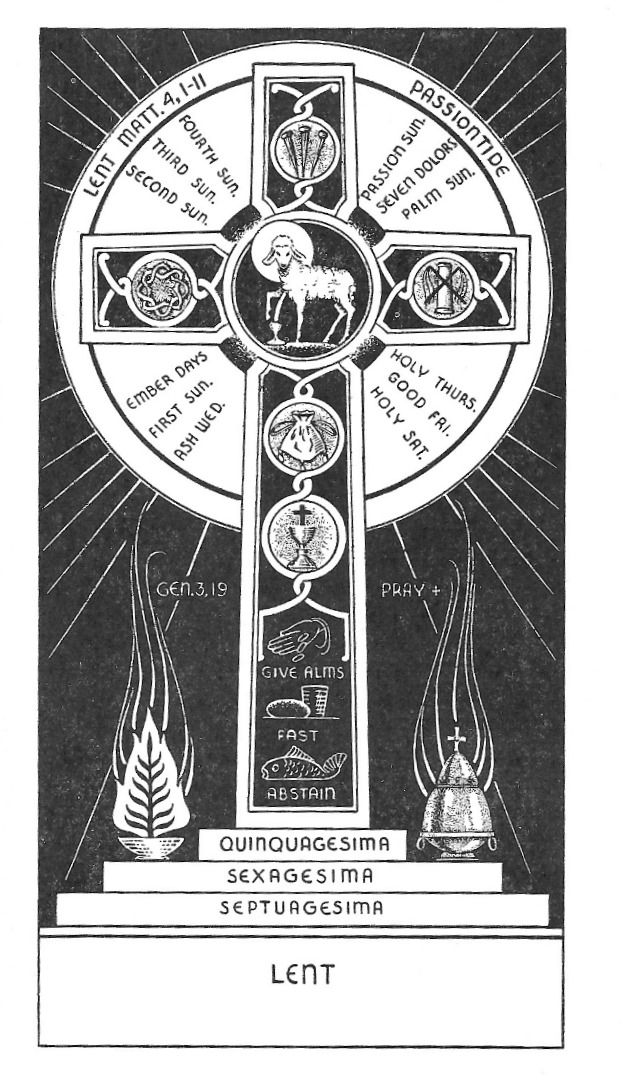
This is made clear over those Sundays in the Readings at Mass, the suppression of the Alleluia, not sung again until Easter, and in the Office of Readings, where we’re given a triptych of the three great patriarchs: Adam, Noah, and Abraham, types of “future good things.” 

Adam may first be our father in sin, but he is finally the forerunner of the second father of mankind, Christ. Facing the end of all flesh, Noah is obedient to God’s command, saving mankind on an ark of wood, delivered through a baptism of water, lead to a new creation.
And Abraham’s is the great example given to us for all time, whose sacrifice of faith merited for him a recompense of righteousness, as he foreshadows Christ who will be both priest and victim, who trusts in his Father to deliver him and his Church from the ignominy of the cross.
The Epistle of Septuagesima Sunday is from St Paul, who counsels us to run the race and fight the good fight, so as to win! And who reminds us that Israel was baptized in the cloud and the sea, just as they ate spiritual food and drink: we must recapitulate their journey too.
Its Gospel is the Parable of the Vineyard: we are called too, but the last will be first, and the first last. In the next Sunday, Sexagesima, St Paul tells us about the glory of weakness, that even such as he had been granted a thorn in the flesh to learn humility.
For it is God’s grace that makes us finish this race of Lent, not our ability: learn that God’s power is made perfect in our weakness – that is the point! And yet the Gospel illustrates our needed response to grace: the Parable of the Sower. We must prepare the soil of our lives!
The last is Quinquagesima Sunday. There St Paul implores us to seek the greater gift of charity, without which, regardless of my accomplishments, I am nothing. Then the Gospel tells of Christ’s prophecy of his Passion as he approaches Jerusalem, our same destiny approaching too.
But it continues with the stirring encounter of Jesus and the blind man on the road to Jericho. Desperate, feeling hopeless, he hears that Jesus is approaching: his only hope, he cries out with all his might, despite discouragement. That faith is all that is needed. He is healed.
Even more could be said of the various prayers and formularies in the Mass, dating from the sixth century. But the end of singing the Alleluia is perhaps the most profound symbol of all. “By the waters of Babylon, there we sat down and wept, when we remembered Zion….”
“How shall we sing the Lord’s song in a foreign land?” We too are preparing for a time of strangeness. Let Lent never become too familiar! Let it always makes us strive and struggle toward its overcoming by hope, as in life, as we long to see our Zion, to dwell in that holy city!
Its meaning is given in the 10th century hymn traditionally accompanying this season: “Alleluia cannot always be our song while here below; Alleluia our transgressions make us for a while forego; for the solemn time is coming when our tears for sin must flow…
“Therefore in our hymns we pray Thee, grant us blessed Trinity, at the last to keep thine Easter in our home beyond the sky; there to Thee forever singing Alleluia joyfully.” In fact, many cultures took this one step further, as they put away “Alleluia” on that First Vespers:
They would lay her, written on a scroll, in the shape of a small coffin, to be buried on the church property! The Gloria and the Te Deum too are omitted in this season, and Violet vestments are worn. Some fasting would be done, but to prepare for the greater fasts of Lent. 
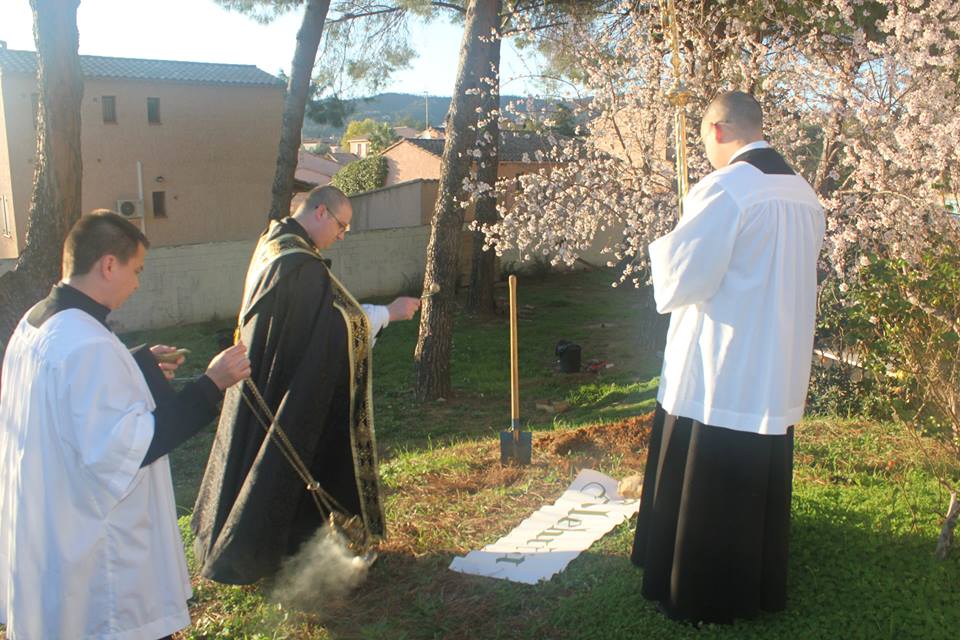
Only on Quinquagesima would the faithful begin abstaining from meat (hence, the days of Carne-val, farewell to meat). And in those last few days before Ash Wednesday, particularly in northern Europe, the focus of Septuagesima-tide would find its culmination. 
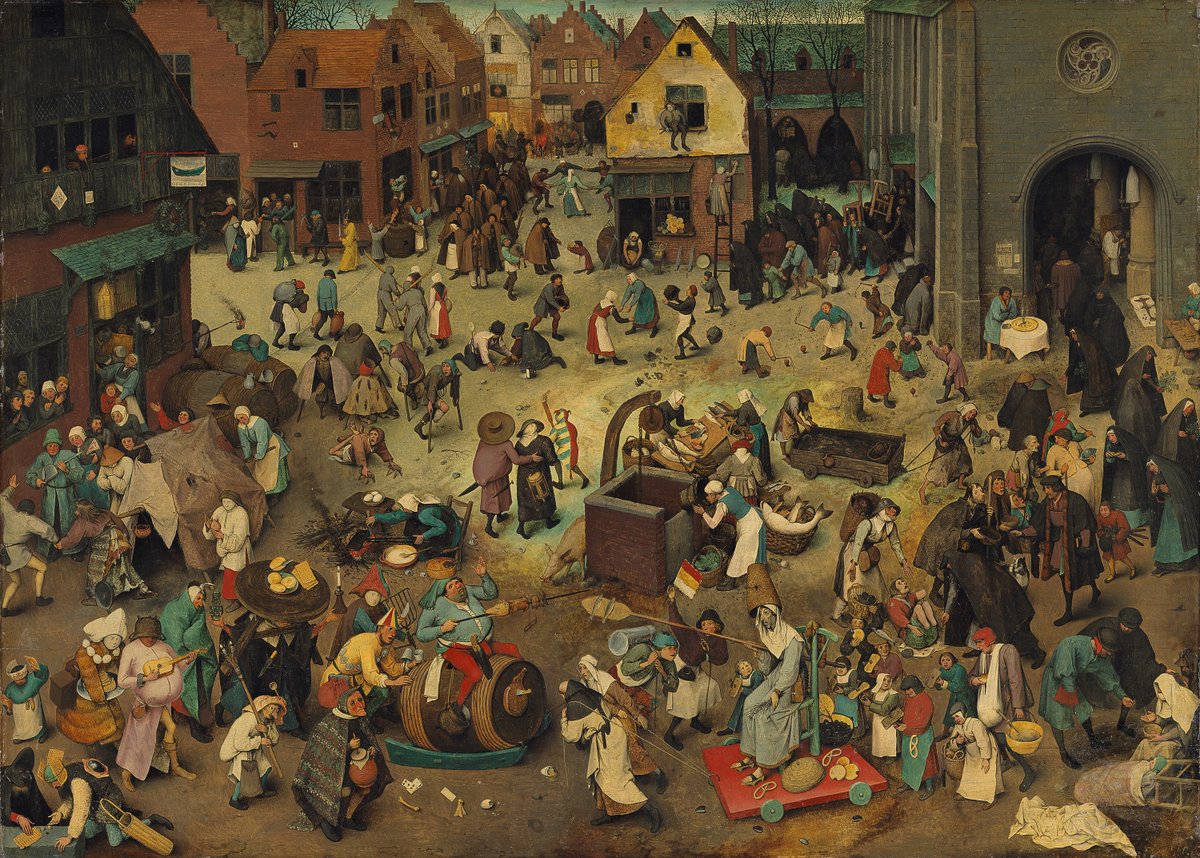
In these countries it came to be called “Shrovetide,” after Shrove Sunday, Monday, and Tuesday. While “to shrove” originally means to “make merry”, its closeness to “shrive” (“to absolve from sin”) may have helped associate it with the Sacrament of Reconciliation. 
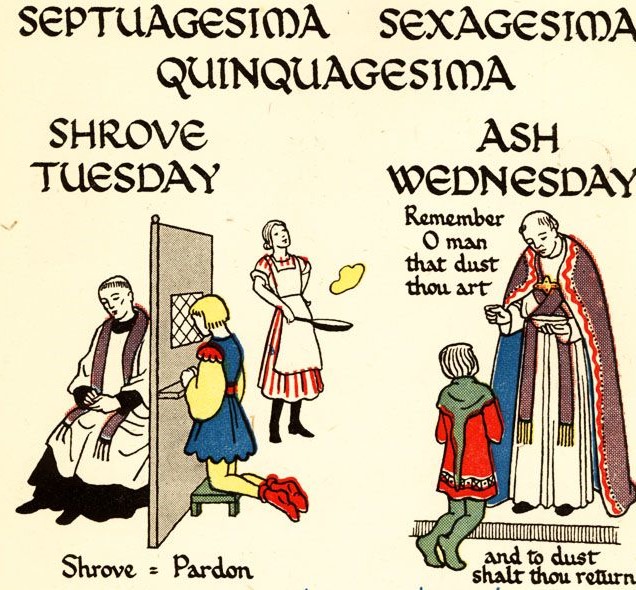
Traditionally celebrated on those days, Confession is the best done not at the end of Lent, but before its beginning! This may sound counter-intuitive, but once seen it reveals a beautiful mystagogical tradition worth recovering.
As we remember, Reconciliation has four parts:
As we remember, Reconciliation has four parts:
Confession, Contrition, Absolution & Satisfaction. Accordingly, after we confess our sins, we express our contrition for offending God by saying so. And it can be easy to feel, at that point, the work is done. Having been absolved, gotten it off our chest, it’s time to move on!
But did we not make an additional promise? “I resolve to sin no more, to avoid the occasion of sin, to do penance, and to amend my life.” Our work has only just begun! Sadly, this part, reforming what was damaged by our sin, is too easily forgotten in the rush to leave.
Thankfully there is a season devoted to just that! While Septuagesima focuses on remembering that we have sinned, examining ourselves, and preparing for Confession, Lent takes the next step: time now to amend our lives, to strengthen our resolve to sin no more, to do penance.
In short, having been shriven, it's time to begin those spiritual exercises of purification and amendment. Lest we take that in a Pelagian way, Lent prepares us to see how holiness is gained by immersion in the Paschal Mystery of Christ, by sharing in the cross, in his death.
Though we are mostly without these beautiful traditions of Septuagesima now (though the Anglican Ordinariate and the TLM preserve it, as do Anglicans and Lutherans, not to mention all Eastern Christians who have their own analogue), we can still practice it in spirit:
Think about taking these next three weeks to prepare for Lent: not just thinking of what you will give up, but examining yourself and how you have lived, meditating on the mystery of sin, and preparing to make a very good confession, so you can be ready for the fight.
And having been shriven, anticipate the celebration of Easter on Fat Tuesday: rejoice in the gift that makes us a new creation, that brings us closer to that final glory, the source of our transformation: our share in the Passion, Death, and Resurrection of Christ. 
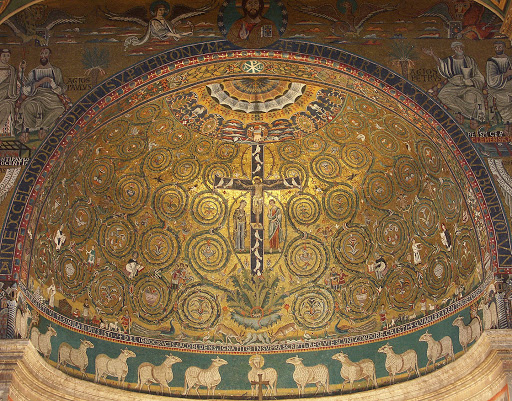
(So eat some pancakes, paczki, and king cake: fisheaters.com/customsseptuag…
@amywelborn2 also has a great take, as usual, on this season, here: amywelborn.wordpress.com/2015/02/01/sep…)
@amywelborn2 also has a great take, as usual, on this season, here: amywelborn.wordpress.com/2015/02/01/sep…)
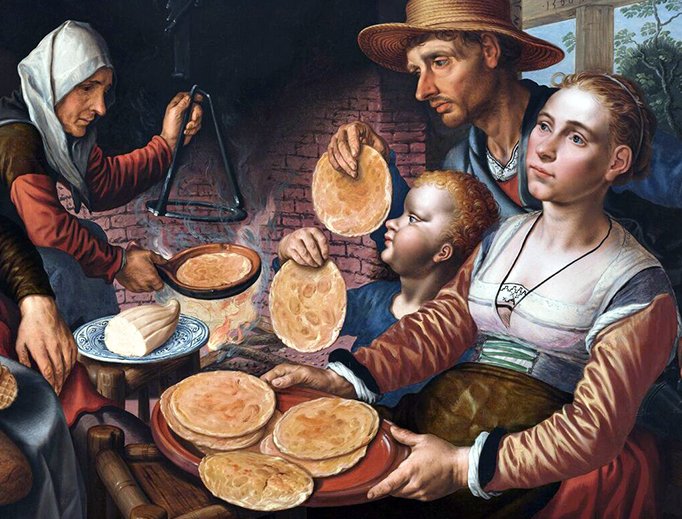
• • •
Missing some Tweet in this thread? You can try to
force a refresh


